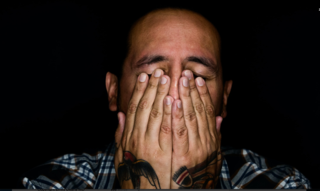Psychosis
Can COVID-19 Cause Psychosis?
Evidence builds for more frightening but rare complications of the pandemic.
Posted December 31, 2020 Reviewed by Devon Frye

This week, an article in the New York Times invited a lot of commentary on the news and social media: “Small Number of Covid Patients Develop Severe Psychotic Symptoms” It sounds bad, but what does it really mean?
Psychosis, by the medical definition, is a symptom that can be due to many causes. In broad terms, it is a disorder of thinking consisting of any or all of the following: delusions, hallucinations, and disorganization of thought or behavior.
Hallucinations in psychiatric disorders tend to be auditory (such as hearing voices or conversations that aren’t there), but they can also be tactile (feeling bugs crawling over the skin during severe alcohol withdrawal), visual, or even olfactory (much more likely to be a neurologic cause, like a seizure). Delusions are a false, fixed belief—for example, that the government has hired the neighbors to spy on you as they walk their dogs. The “disorganization” is sometimes being so out of touch with reality that it is difficult to eat, change clothes, or dress, and speech can become fragmented or even mute. Psychosis can be caused by drug or alcohol intoxication and withdrawal, medical illness, high fevers, cancer, tumors, steroids, and primary psychiatric disorders, among other things.
Sometimes, hallucinations are just an isolated occurrence, or completely benign, and need no treatment. For example, many people have fleeting perceptual disturbances right when they wake up called hypnopompic hallucinations. These are normal and not a sign of any problems or illnesses.
Often, when folks are very ill, they can be confused, hallucinate, or be paranoid that the nursing staff is trying to kill them or the oxygen bottle is poison. These symptoms tend to wax and wane through the day and are due to delirium, a particular change of consciousness and behavior during serious illness or after surgery. The precise cause is unknown, but it is assumed to be a combination of inflammatory reactions to illness plus the medications and environment of the hospital and ICU, which can disturb sleep and alter consciousness. COVID-19, with its long hospitalizations, high fevers, and severe inflammatory responses can often lead to delirium—up to 65 percent of patients in the ICU with COVID have delirium, and alteration of consciousness is sometimes the first symptom of COVID in older adults that leads the family to bring them to the emergency room.
Delirium can be frightening and even dangerous. Patients, in fear and confusion, can try to escape, pull out IVs, catheters, and breathing tubes, and even attack family or staff. However, delirium is temporary. With time, treating underlying causes, trying to disrupt sleep as little as possible, and having familiar items (like family photos) at the bedside, then symptoms tend to improve. It does not lead to lasting psychosis, though sometimes it can cause lasting psychiatric symptoms such as anxiety or flashbacks.
The New York Times article first referenced a study of people in the hospital, or newly recovered, 10 of 153 who had “new-onset psychosis.” COVID-19 can be complicated with strokes, and even inflammation or infection of the brain itself, so along with delirium, other neurological complications including new psychotic symptoms would be expected. These symptoms often occur with serious illness, strokes, seizures, etc., and are more notable and common when millions of people are sick at the same time.
Part of this subset are younger people who present with no psychiatric history but have new psychotic symptoms (such as brandishing a knife at family members, thinking someone will kill them) and no other signs of COVID-19. This can happen with other infections, like other viruses that can go to the brain. So again, this is nothing new, but the sheer number of cases of this rare presentation will be alarming due to the mass infection with the pandemic.
A second group of patients sounds more alarming. This group had mild COVID-19 perhaps with a few minor neurologic symptoms, such as headache or loss of smell. Then weeks months later they present with florid psychosis. From the Times:
“The patient, a 42-year-old… mother of four young children, had never had psychiatric symptoms or any family history of mental illness. Yet there she was, sitting at a table in a beige-walled room at South Oaks Hospital… sobbing and saying that she kept seeing her children, ages 2 to 10, being gruesomely murdered and that she herself had crafted plans to kill them.”
Since schizophrenia tends to have onset in late teens to early thirties, and paranoia associated with dementia tends to present in later years, it’s very unusual to have a 42-year-old otherwise healthy person with no history suddenly show up with psychosis when there aren’t drugs or a brain tumor or something like that involved. It does happen, however, and it’s called delusional disorder. This syndrome is delusions without the other issues of memory loss and gradual decline such as you might see in dementia, or hallucinations and disorganization you might see in schizophrenia. Often there is no known cause, but there are case reports of it happening with celiac disease, treatment with acne medication, or with other psychotic symptoms after herpes encephalitis. It can usually be treated with meds, but depending on the situation, can be very scary for patients and families.
It’s possible that delusional disorder almost always has some sort of metabolic, infectious, or medication cause, sometimes minor, maybe a virus that caused a headache, at months remove. So again, it is nothing new that we are seeing these rare cases with COVID—there are just many more of them right now, as so many people have been infected at once. The vast majority of people will very likely recover and be fine, but the physical and mental serious complications, disabilities, and death at unheralded numbers from COVID will follow our society for years to come.
Copyright Emily Deans, M.D.




